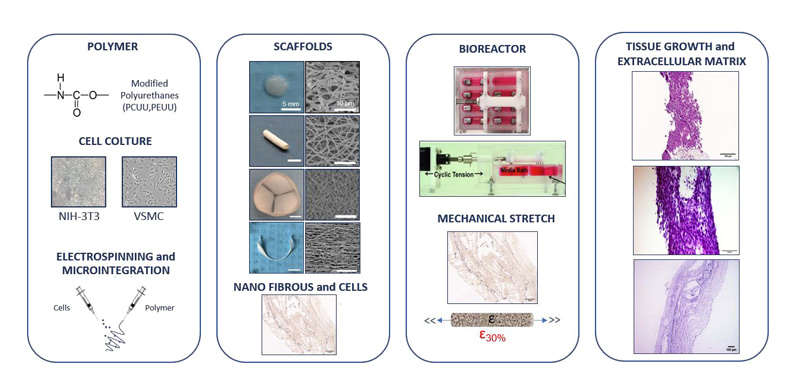
Bioreactors for Enhanced Extra Cellular Matrix elaboration (BE-ECM)
Brief description
Main topic: in vitro elastomeric models to investigate soft tissue mechanobiology.
Three macro-areas are recognized as crucial to understand the factors that drive tissue repair and de novo tissue formation: I) mechanical models able to correlate the macro, meso and micro scales, II) tissue growth models with the ability to correlate mechanics and tissue elaboration, III) scaffold degradation models able to correlate mass loss with mechanical loads and deformations. The BE-ECM research line, integrated by NET-IBA and NET-MTG, tries to address these three critical topics by introducing and perfecting physical, in-vitro models able to study tissue growth, cell behavior and biomaterials degradation.
Impact:
Potential impact of this research might involve improved capacity to:
– simulate endogenous tissue growth on engineered scaffolds under mechanical load and deformation;
– simulate in vivo degradation of engineered scaffolds;
– investigate the impact of material topological and mechanical cues on ECM elaboration.
– investigate how cell signaling and biochemistry interact to guide cell behavior in biomaterials
This in vitro modeling ability might allow to expand the understanding of biomaterials mechanobiology and might allow to assess, using simplified tissue surrogates, the efficacy of novel tissue engineering strategies. Examples of these modeling efforts include: mechanisms to accelerate tissue growth, solutions to modulate material degradation characteristics, topological cues to dictate cell differentiation and lineage.
Pipeline
-
CLINICAL
NEED -
DISEASES
ANALYSIS - DISCOVERY
-
PRECLINICAL
VALIDATION -
PRECLINICAL
DEVELOPMENT -
CLINICAL
STUDIES

Principal Investigator
Contact
Research group:
Therapeutic area:
Products:
ATMP – Medical devices & tissue engineering
Collaborations:
UK Dementia Research Institute (UK DRI) – King’s College London, Londra, Regno Unito
European Brain Research Institute Rita Levi Montalcini (EBRI), Roma, Italia
Scuola Normale Superiore di Pisa (SNS), Pisa, Italia
Dipartimento di Medicina Molecolare – Università degli Studi di Pavia, Pavia, Italia
Covid19-NMR International Consortium
Scarica il pdf del progetto
